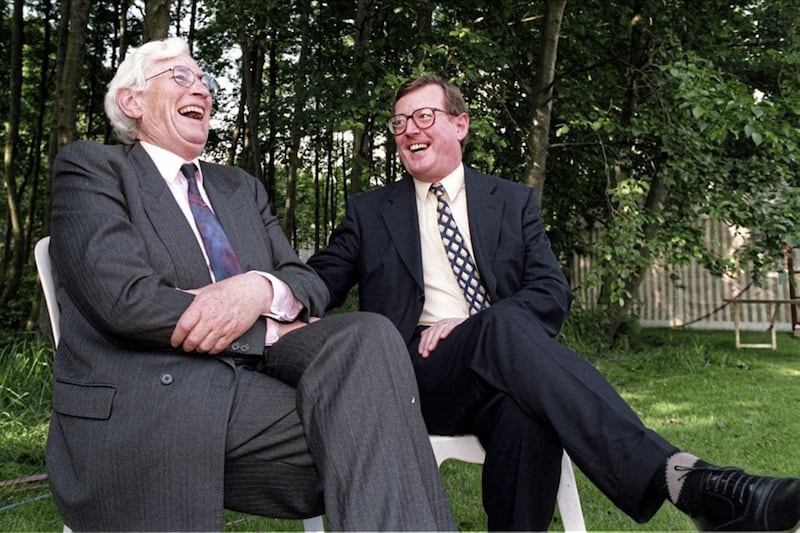It’s easy to sometimes manipulate figures to suit a particular narrative. Commentators do it (Mea culpa).
Modern leaders of political parties must look back in envy at the longevity of their predecessors. Leaders were rarely purged. Some took the tumble after one election too many. Others jumped ship in order to protect or salvage their reputations. Some simply headed off to write their own histories.
There’s nothing particularly insightful to be gained from measuring the longevity of political leadership or correlating it to the fortunes of their respective organisations. Across the island of Ireland, all parties, north and south, have watched leaders come and go. Some with relief, others to applause.
- Tom Kelly: Fine words at Stormont won’t butter any parsnipsOpens in new window
- Why it’s time to lance the boil of toxicity and hatred - Tom KellyOpens in new window
- Loyalist opposition to the GAA and ‘Irish’ culture has much to do with a losers’ psyche, built by successive leaders of unionism - Tom KellyOpens in new window
In Northern Ireland, the Ulster Unionists are in a league of their own when it comes to changing leaders with no fewer than 10 post holders since 1970. The frequency of turnover is increased at times of political crisis.
In the south, it’s the Irish Labour Party which tops the poll of the most leaders from 1970 to the present, with 11 title holders.
As a political entity, Sinn Féin is a bit of an anomaly when it comes to the normal rules governing the selection of party leaders. Their process is shrouded in secrecy and is about as democratic as a conclave of cardinals selecting a Pope.
After the laying on of hands, the laity/party membership are there to simply ratify the outcome and follow.
Since 1970, leadership crises within the republican movement resulted not so much in a change of leadership but a split in the very organisation; first to the left, with the creation of the ‘stickies’ aka Sinn Féin The Workers’ Party and then again in the 198)s, leading to the creation of the more hardline and orthodox Republican Sinn Féin.
Since then, Sinn Féin has only had two leaders, which makes it rather unique. One suspects this lack of transparency and tendency towards autocracy isn’t sustainable when aspiring to join accountable and open government.
Fine Gael, once on the verge of a political obscurity, now seeks a record number of terms in office. Their leadership tally is eight since 1970. Within their number are several leaders buried with the moniker of memorable failures.
Still the largest party within unionism, the DUP’s veteran MPs are ageing. It’s riven with divisions, despite the best efforts of the leader. In a clapped out DeLorean (with too many back seat drivers), the once omnipotent DUP is being pulled back from the future
The Alliance Party has watched its fortunes ebb and flow since 1970. They have had seven leaders in total and whilst they have never quite reached the dizzy spells of vote share, they have secured the bronze medal position under Naomi Long. The Alliance leader is now the second longest serving leader in the north after Colum Eastwood, who is approaching 10 years in post, and still just 41.

Tied in the party leader stakes are the SDLP, DUP and the indefatigable Fianna Fáil. All three parties once shared a dominance in their respective domains. In different ways all three hit the skids too.
Structurally speaking, the SDLP has always struggled transitioning from being a civil rights-based movement to a political party in the traditional sense. Despite having some of the most attractive policy positions, the party is heavily dependent on local chieftains and their abilities to manage fiefdoms.
Fianna Fáil is the unsinkable Molly Brown of Irish politics, as they are again in contention for another term in government.
The DUP position is precarious. Still the largest party within unionism, its veteran MPs are ageing. It’s riven with divisions, despite the best efforts of the leader.
In a clapped out DeLorean (with too many back seat drivers), the once omnipotent DUP is being pulled back from the future.
The almost Damascene revelation by Edwin Poots that the DUP need to reach out to new resident communities to replace the dwindling white Protestant working classes on which they once relied is breathtakingly bewildering.
The US chat show host Oprah Winfrey said “turn wounds into wisdom”. Politicos often do more wounding with words than any bullet, so maybe the measure of their political success should be calculated by their wisdom, not longevity.










